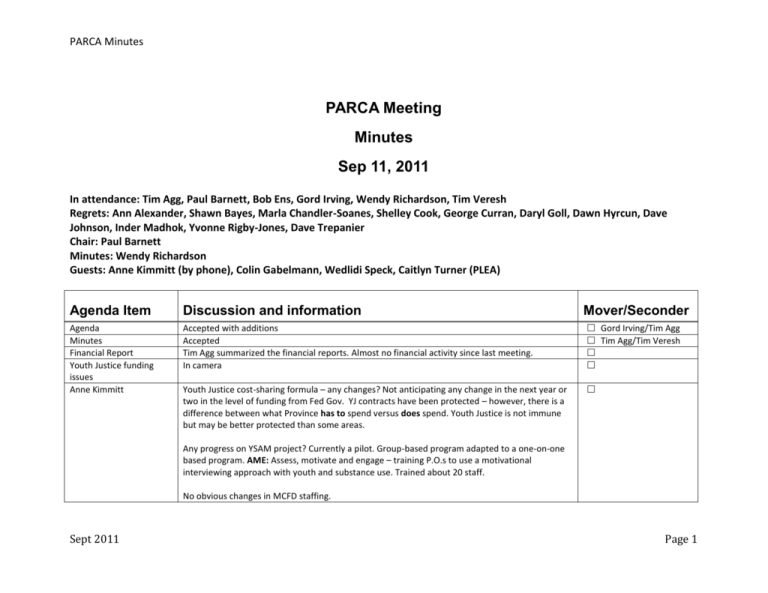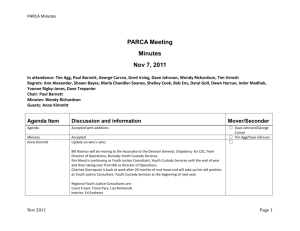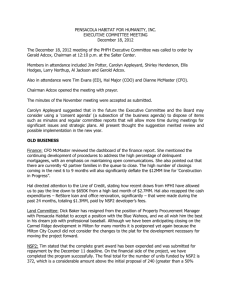September 2011
advertisement

PARCA Minutes PARCA Meeting Minutes Sep 11, 2011 In attendance: Tim Agg, Paul Barnett, Bob Ens, Gord Irving, Wendy Richardson, Tim Veresh Regrets: Ann Alexander, Shawn Bayes, Marla Chandler-Soanes, Shelley Cook, George Curran, Daryl Goll, Dawn Hyrcun, Dave Johnson, Inder Madhok, Yvonne Rigby-Jones, Dave Trepanier Chair: Paul Barnett Minutes: Wendy Richardson Guests: Anne Kimmitt (by phone), Colin Gabelmann, Wedlidi Speck, Caitlyn Turner (PLEA) Agenda Item Discussion and information Mover/Seconder Agenda Minutes Financial Report Youth Justice funding issues Anne Kimmitt Accepted with additions Accepted Tim Agg summarized the financial reports. Almost no financial activity since last meeting. In camera Gord Irving/Tim Agg Tim Agg/Tim Veresh Youth Justice cost-sharing formula – any changes? Not anticipating any change in the next year or two in the level of funding from Fed Gov. YJ contracts have been protected – however, there is a difference between what Province has to spend versus does spend. Youth Justice is not immune but may be better protected than some areas. Any progress on YSAM project? Currently a pilot. Group-based program adapted to a one-on-one based program. AME: Assess, motivate and engage – training P.O.s to use a motivational interviewing approach with youth and substance use. Trained about 20 staff. No obvious changes in MCFD staffing. Sept 2011 Page 1 PARCA Minutes Anticipate that YCJA amendments will likely reappear in the omnibus crime bill – don’t know yet whether there will be any changes as a result of evidence that has been presented about youth justice. No changes to cost-sharing with Feds. Discussion about standards for youth justice residential programs – initial draft should have been released earlier this summer – standards exist for child welfare beds – what standards are available for youth justice beds? Are foster home standards appropriate? Youth Justice Forum in November – confirmed for 8th and 9th. Spaces allocated by region. Half day on 7th with Paula Shaeffer on working with girls in the justice system. If any cancellations in government spaces, may be offered to contracted sector. Community and custody counts down a bit – custody average was 121 last year, down from about 130. This year to-date average about 110. Community average – this year 2050, last year about 2200, year before about 2400. Roughly parallels crime rates so reducing numbers. Gord Irving commented that numbers might be down but severity of issues is increasing. Lower risk kids are not typically on caseloads any more. More challenging youth are those remaining in the system. Tim Agg brought up permissible versus prohibited activities. Mixed messages from MCFD about what are healthy and safe activities. Anne will explore this topic with others in the ministry. Paul indicated that PARCA would be interested in joining in on this activity. JHSNI Tour Colin Gabelmann Sept 2011 Anne asked about protocols related to youth entering FTAPs while taking medications such as psychotropic medication. Wendy, Gord and Tim reported on the various protocols used by their residential programs. All three agreed that medications are not a barrier to entry into the programs. Brief discussion about confidentiality around health issues when youth are entering a program. Tour of Barnett House, Full Time Attendance Programs – Headstart and Oasis, and Youth Internet Café (Delaware) Tim Veresh explained that bargaining was finally settled and just waiting for ratification. Tim explained that the big issue was money but the mandate from govt was zero, zero, zero. Union was upset about closing of group homes (CLBC). Almost settled at the end of March but further planned closures upset the unions. Current agreement expires March 2012 so only six months. Nine unions trying to negotiate together added to challenges and Labour Board ruled that they do Page 2 PARCA Minutes not need consensus – the largest union plus one other equalling at least 50% of membership can cut a deal. Such variety amongst size and type of organizations makes hard to negotiate a settlement that fits all. Bargaining all together is creating difficulties and standardization that doesn’t necessarily work in this sector. Colin discussed role of CSSEA. Expansion of contracted agencies, represented by CSSEA, allowed downsizing of government and opportunities for innovation. [look up Judy Corbin] Whipsawing was a problem in BC – this model got rid of it. Looked at the models that existed in the 70s and 80s in the forest sector and construction industry. They had central bargaining for central issues then small contracts for individual employers. Suggested that an important place to start is to look at how to get the problem back on the political agenda. When CSSEA was created it was supposed to be arm’s length from govt and not as arbitrary as today’s zero, zero, zero. MCFD was putting something on the table and then taking it off again. Tim Veresh wondered who was bargaining – CSSEA or govt. – if CSSEA is empowered to bargain then they need the real power to do so. Tim Agg and Tim Veresh provided examples of the problems in this sector, for example, the different salary levels between nurses in the health sector versus nurses in the social services sector. Colin pointed out that governments are so overloaded that getting this kind of topic onto the agenda is difficult. Tim Veresh reminded that the HRLR service in CSSEA is valuable but bargaining is problematic. Tim Agg talked about out-of-date job descriptions that cannot be brought up to date because of the JJEP. Colin suggested that we need a strategy to encourage govt to look at dysfunction because it is demonstrated that the dysfunction leads to public harm. As problems emerge it will be important to have spokespeople to demonstrate cause and effect to the public. Organizations other than CSSEA need to take the lead here – PARCA, CEO network, etc. Colin proposed a conference to explore the intellectual foundation of the problem and its solutions. Sept 2011 Page 3 PARCA Minutes Wedlidi Speck Agreement that conversation should be continued at next meeting in Vancouver. In addition, Tim Veresh, Tim Agg, Paul Barnett and Colin Gabelmann will have a further discussion and bring forward recommendations. Director of Aboriginal Service Change for Vancouver Island. How does Wedlidi see change in the ministry with regard to change in youth justice? New ADM, Stephen Brown, very corporate, wants accountability and measurement. Getting down to business – Brown is about delivering. All regions have gone through changes. Wedlidi described changes in the ministry. Director of Corporate Services will be hired in the next few weeks – will oversee budget approvals. [get list of new positions] Brown wants to see improvements in service and improvements in access to service. Created standing committees to do the planning. Brown’s ‘bible’ is the The Execution Premium: Linking Strategy to Operations for Competitive Advantage by Kaplan and Norton – understand his thinking by looking at this book. Time frames of 30, 60, 90 days – want are the plans in each time period, outcomes and how are these measured. Shift in level of accountability. Structural models are the same for each region. Brown wants one point person in each region. Under Leslie Detoit there was a philosophy of how MCFD and aboriginal communities would work together. Brown claims this exists but evidence suggests this may not be the case. Wedlidi’s concept was described by ‘Paddling a New Canoe’. Brown finds this too vague – wants concrete actions: delegated agencies to be supported with a range of responsibilities mostly to do with children in care. Agencies at different levels (1 – 6). Wedlidi’s role to support these agencies. Aboriginal authorities being developed – Brown says if aboriginal authority are being developed what is MCFD giving up. Delegated agencies – are delegated by ministry to be responsible for children in care. Legal agreement with ministry to take responsibility. Aboriginal authority may be in partnership with delegated agencies but may be broader. Sasamans Society is trying to become an aboriginal authority. Many Nations is trying to become a delegated agency. Roots program has been successful and has supported role of delegated agencies. ‘Culture package’ would follow children in care and help to provide connections. Aboriginal resource teams within MCFD have been helpful. Focusing on access and what prevents that. Touchstones – what wounds or traumas are getting in Sept 2011 Page 4 PARCA Minutes the way of aboriginal people accessing services – successful in the north? Disentanglement not a priority on Wedlidi’s table. Hard for an aboriginal community in Alert Bay to look after its community in other areas. Zero budgets over next three years – no deficits. Wedlidi described no-cost ways of improving access. Challenging aboriginal communities to ask how the community can take back responsibility for the kids. Existing apathy and entrenched victimization in some communities. Ahousat challenged USMA to understand aboriginal needs better – in fact to ‘indigenize’ itself. MCFD standards of practice have been pulled over to aboriginal sector and research underway into how to adapt these MCFD standards to make them culturally appropriate for delegated agencies and aboriginal organizations. Wedlidi Speck indicated that he plans to proceed very slowly in terms of aboriginal youth justice. He has too many other commitments right now. Tim Agg asked about educational opportunities for aboriginal people in social services sector. Aboriginal Youth Intern program – youth people funded to spend a year with the ministry in a mentorship situation. Discussion around retaining aboriginal people within non-profits. Retention is aided by growth and change opportunities within agencies. Tim Agg described PLEA’s partnership with the Sto Lo Nation specifically around the KidStart program. Wedlidi suggested a bicultural approach can be really successful. Aboriginal client numbers in non-aboriginal agencies have not gone down. Wedlidi described differences between traditional, decultured, bicultural and assimilated. Cultural core beliefs inventory – six questions to help determine where aboriginal people fitted in these four core areas. Practice needs to understand where the client is and adjust services to meet those needs. Culture and treatment (addictions) paper that Wedlidi did when at JHSNI. Wedlidi described several cases in which he used cultural practices to assist aboriginal youth to achieve their goals. Gord suggested inviting Wedlidi’s counterparts to joint future PARCA meetings. Sept 2011 Page 5 PARCA Minutes Affiliations BC Halfway House Association: Tim Veresh stepping down as president. Nathan Rock taking up role of ambassador. Training coming up with Tim Beachy. Everything going fairly well. CSSEA: New CEO hired. Bargaining concluded. Four criteria for hiring – weighted equally: seniority, qualifications, performance, ability. New bumping language – 2nd person no longer goes to the bottom – first 3 can bump anywhere, then after that bottom of classification. Hiring pool is being explored at the sector table. Mandate ends March 2012. Tim not going to be on the bargaining panel next time. Stepping down from the board at next AGM. BCCJA (BC Criminal Justice Association): Congress 2013 is coming to BC – date could change. The agenda is Criminal Justice in the 20th Century. This year’s congress is in Quebec City at end of October. Victoria has created its own branch of BCCJA. Co-op: Tim Agg reported that the Co-op is back into the hiring process for another CEO. Last one didn’t work out and left very shortly after being hired. Just finished its best financial year ever. The consulting work is in demand, particularly for groups impacted by the new employment contract. Acting ED is Alison Marshall. BC Corrections: Paul Barnett didn’t hear back from Brent Merchant. Tim Veresh reported positive experiences with BC Corrections right now. New inreach programs. Custody centres are over capacity. Adult Forensic: Additional outreach program for mentally disordered offenders in Campbell River has started. Old Business Provincial Employment Program: Selection process still ongoing. Board Voice: Planning underway for AGM/Conference. Almost 70 members now. New Business Future Directions for PARCA: Invite Anne Kimmitt to next PARCA meeting. See if Alan Markwart is available. Dean Wilson to be approached. Time Veresh will approach Colleen Kerr. Statutory Release: CSC is saying that stat release is not going to be part of the omnibus crime bill. Internet Access and Protection of Staff: Concern about protecting staff who are using risky sites legitimately as part of their work to find information that will help them to work with their clients. Tim Veresh suggested using “Working Alone” policies to support staff accessing these sites, Sept 2011 Page 6 PARCA Minutes including notification to manager etc. Tim Veresh suggested that first question to ask is “what’s the purpose”. For example, teens using Craig’s List to promote themselves in the sex trade. Staff will look at these sites to learn what clients are doing. Gord Irving feels that, in the absence of policy, access to these sites can be seen to have tacit approval. Tim Veresh and Tim Agg wondered whether these sites are of any great use except in rare situations. File and Case Review: Gord Irving asked whether anyone has actively engaged in a file review with outside authorities unless triggered by a critical incident? Tim Veresh reported doing it quarterly as an internal practice. Tim Agg thought there could be some real value in reviewing cases with other agencies. JHSNI looks at identified cases with external consultants with MCFD. Bob Ens reported on weekly consultations with outside agencies including RCMP and Parole Officers. Awards: Currently no awards around community justice in BC. Tim Agg believes there should be a Lieutenant Governor’s award for this field. Paul Barnett will follow up on this. Next PARCA meetings: 1) Vancouver, November 7, 2011 – full-day meeting – Hotel Vancouver if possible 2) Victoria, February 15 – 16, 2012 3) Prince George, June 6 – 7, 2012 Sept 2011 Page 7










